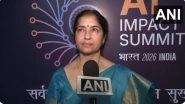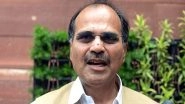New Delhi, Feb 9 (PTI) Terming the road accidents scenario in India "much serious than COVID-19 pandemic", Union Minister Nitin Gadkari on Tuesday said more than 40,000 kms of highways have been brought under safety audit to check deficiencies causing accidents.
It is a sordid state of affairs that Indian roads witness 415 deaths per day in accidents, the highest in the world, and losses amount to 3.14 per cent of the GDP, Road Transport and Highways Minister Gadkari said.
India accounts for the highest road accidents globally, with 1.5 lakh people being killed and more 3.5 lakh crippled annually.
"Seventy per cent deaths are in the working age group of 18 to 45 years old. There are 415 deaths per day in road accidents in India. I would say this scenario is very much serious than COVID-19 pandemic and it is becoming an alarming situation for us year on year.
"Unfortunately we stand at position 1 in the road accidents in the world, ahead of US and China. Being transport minister, I am sensible and serious for the subject," Gadkari said.
He was speaking after inaugurating a webinar series by road safety body IRF's India chapter on 'Road safety challenges in India and Preparation of an Action plan'.
Stating that road safety audit during different stages of development appears to be the most suitable way to correct all deficiencies causing accidents, the minister said more than 40,000 kms of highways have been brought under auditing.
"The road safety institutes like IRF along with engineering colleges and IITs can help the government in road safety audits. Each engineering college can be given about 300-500 km of road stretch for road safety audit with some financial aid. Third-party road safety audits will help in finding engineering faults and correcting them," he said.
Underlining that 'prevention is always better than cure', the minister lashed out at people behind faulty detailed project reports (DPRs) and sought collaboration from the International Road Federation (IRF) and other bodies for vetting these in a fortnight's time.
"Many of DPRs are in very bad shape with lots of technical deficiencies which create further black spots (accident spots). DPR should be proof-checked and revised by competent authorities, third-party agencies, and educational institutions before implementation," Gadkari said.
The government has proposed a State Support Programme to incentivise the states with Rs 14,000 crore funds, out of which Rs 7,000 crore would be from the Asian Development Bank and World Bank and the balance Rs 7,000 crore from the Centre to improve road safety, he said.
Wondering why other states were lagging on the road safety front when Tamil Nadu could reduce road accidents by 38 per cent and deaths by 54 per cent, the minister urged states to replicate the Tamil Nadu model. He also stressed the need for qualitative, comprehensive and uniform accident data collection and recording.
"In India, 78 per cent of road accident deaths are of two-wheeler riders, bicyclists and pedestrians. Protection and safety of these vulnerable road user group is the foremost priority of the Centre," he said.
The minister sought the co-operation of all stakeholders to reduce road accident deaths by 50 per cent by 2025 and exuded confidence of achieving it.
The minister also stressed the need for developing digital technologies, drones and app-based platforms and said over 60 per cent of the accidents occur at the road junctions, which clearly indicates that there are deficiencies in their design and construction.
"Can we find alternate solution for junctions by redesigning them into roundabouts/rotaries, grade separators, flyovers or channelised diversions," he said, and added the ministry is working on more than 5,000 black spots identified on the highway network.
Gadkari further said the chairman of the National Road Safety Council will be announced soon as this body will be responsible for collecting accident data and suggesting measures to further reduce road accidents.
Stressing that 70 per cent of accident deaths In India are due to over-speeding, the minister said fitness check of all vehicles has been mandated through Automated Vehicle Inspection and Certification (I&C) centres.
"Government has recently announced scrapping policy to deal with old, unfit vehicles and their safety concern. It is expected that more than 1 crore such vehicles would be removed," he said.
The government plans to shift vehicles to alternate fuel and energy sources like ethanol, methanol, Bio-CNG, LNG, and electricity to reduce dependence on fossil fuels.
K K Kapila, President Emeritus, IRF, said, "After the non-realisation of the target of UN Decade of Action for Road Safety (2011-2020), the Global Community had decided on 12 Voluntary Targets to be realised for Road Safety by all countries. The First Target identified by the Global Community is ... reducing the road fatalities to half by 2030 aligned to the Sustainable Development Goals."
For implementing and enforcing the Motor Vehicle Act 2019 in sincerity, the government should remove the human interface from enforcement and extensively use Intelligent Transportation System (ITS) technologies to capture traffic violations, Kapila added.
Others present in the webinar included Luciana Iorio, Chair - UNECE Road Safety Committee; Bill Halkias, President, IRF Geneva; and T K Amla, Secretary, IRF India, among others.
(The above story is verified and authored by Press Trust of India (PTI) staff. PTI, India’s premier news agency, employs more than 400 journalists and 500 stringers to cover almost every district and small town in India.. The views appearing in the above post do not reflect the opinions of LatestLY)













 Quickly
Quickly


